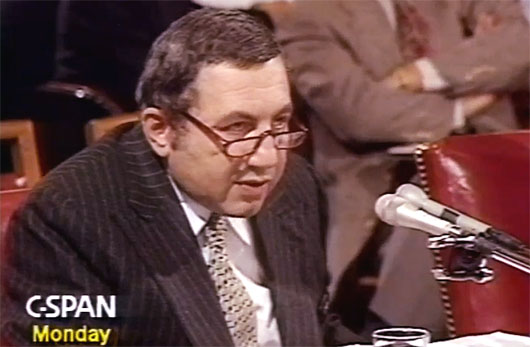by Robert Morton, WorldTribune, December 4, 2017
On Nov. 25, 1991, a Brooklyn-born intelligence expert of Syrian Jewish descent rattled a Senate Foreign Relations subcommittee hearing with his proposed response to the emerging North Korean nuclear threat.
After being challenged he responded with a warning that now, 36 years later, seems eerily prophetic.

While other panelists presented more optimistic assessments of the threat and questioned the survival of the North Korean regime headed by Kim Il-Sung, Dr. Joseph Churba was blunt and direct, based in part on a recent symposium he had held in North Korea under the auspices of his think tank, the International Security Council.
Recalling the daring, long-range Israeli preemptive strike on the Iraq nuclear reactor at Osirak on June 7, 1981, Churba advocated a similar prescription for North Korea:
“Distasteful as it may be to consider such a preemptive strategy there may be no better alternative under the present circumstances.”
Following are excerpts from Churba’s statement as excerpted in his book, “The Washington Compromise“, which he completed shortly before his death in 1996.
“Everything we know about the present regime (in North Korea) suggests that a nuclear weapons capability in its hands would destabilize the politics and diplomacy of East Asia. Moreover, this regime is likely to sell not only nuclear technology, but also plutonium to other radical irresponsible regimes which seek to overthrow the existing nation-state system …
“Pyongyang’s capacity for mischief-making would be used as leverage on the U.S. and the industrial democracies. This is not a scenario we need face or even risk if we are prepared to take courageous steps today …
Related: One who declined ‘The Washington Compromise’, May 5, 1996
“Preemptive, nonnuclear attack against such sources of threat may seem an extreme course of action, but it is preferable to retaliation only after the fact. The alternative is to leave the United States and its allies open to disaster simply waiting to happen …
“Two, three, or four years ago, we had political, diplomatic, and economic sanctions as a lever. That does not exist today. I think the military option which does exist today will be not be here three years from now.
In response to concerns by other panelists and Sen. Alan Cranston that such an option would be prohibitively dangerous, he responded as follows:
“Nevertheless my general answer is that precisely because they are dangerous. I would advocate the preemptive strategy. I cannot believe that we would countenance a situation with a North Korean nuclear capability [that] will increase from day to day and do nothing and even then create even greater dangers that have already been pointed out. There will come a point when even this strategy and even this option would be lost.”
A video of the hearing can be viewed here.
The other panelists before the Senate Foreign Relations Subcommittee on East Asian and Pacific Affairs, chaired by then Sen. Alan Cranston, D-California, were representing the American Federation of scientists, the Wisconsin Project for nuclear arms and the Carnegie Endowment for International Peace.
Churba was an advisor to the 1980 campaign of Ronald Reagan, former senior Middle East advisor to U.S. Air Force Intelligence, president of the International Security Council and editor of the organization’s quarterly journal, Global Affairs.
